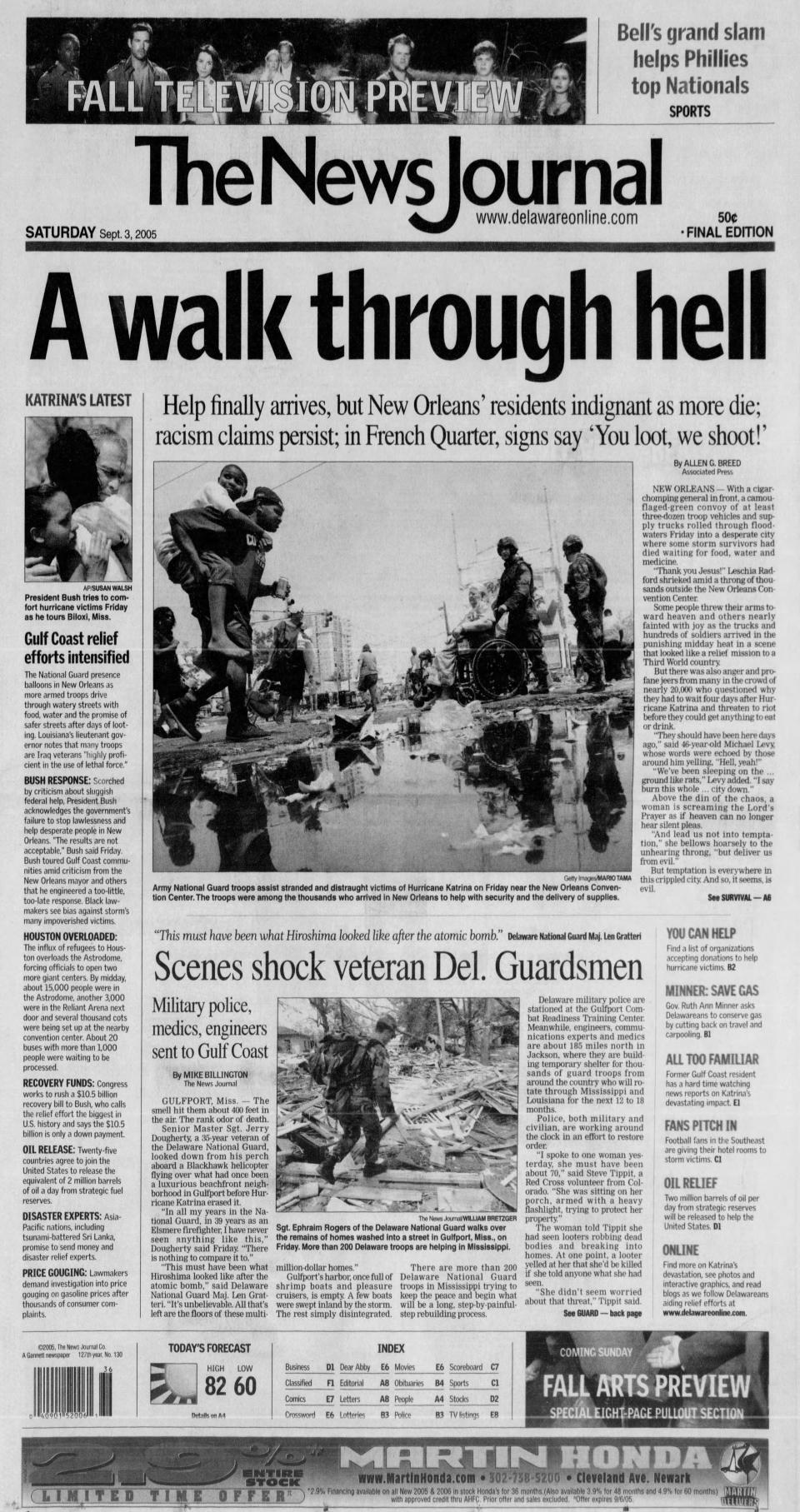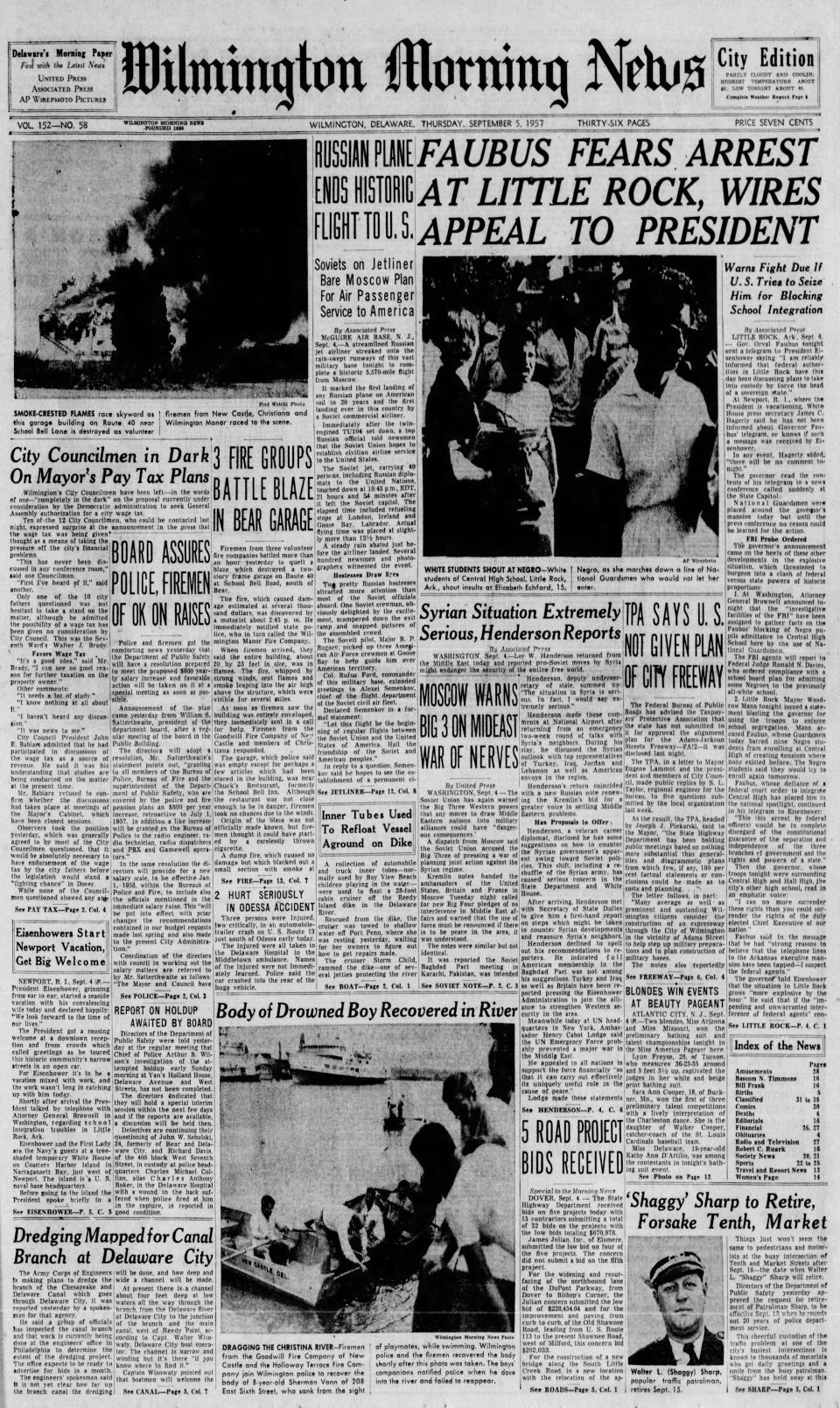Aftermath of Hurricane Katrina, inflation in 1947: News Journal archives, week of Sept. 3
"Pages of history" features excerpts from The News Journal archives including the Wilmington Morning News and the Evening Journal.
Sept. 3, 2005, The News Journal
A walk through hell in aftermath of Hurricane Katrina
NEW ORLEANS – With a cigar-chomping general in front, a camouflaged-green canopy of at least three dozen troop vehicles and supply trucks rolled through floodwaters Friday into a desperate city where some Hurricane Katrina survivors had died waiting for food, water and medicine….
Some people threw their arms toward heaven and others nearly fainted with joy as the trucks and hundreds of soldiers arrived in the punishing midday heat in a scene that looked like a relief mission to a Third World country.

But there was also anger and profane jeers from many in the crowd of nearly 20,000 who questioned why they had to wait four days and threaten to riot before they could get anything to eat or drink….
In the world-renowned French Quarter, armed residents hide behind ornate iron gates like prisoners in a frilly jail. Historic markers on Napoleonic-era houses share billing with signs that warn: “You loot, we shoot!”
At the convention center, where thousands have camped in the streets since Monday awaiting buses out of the city, the despair feeds on itself like a voracious beast.
When National Guard helicopters attempt to land with supplies in the parking lot, waiter Bob Vineyard joins a self-appointed crew to set up a safe perimeter. The crowd surges past them with an almost feral intensity, and the chopper can’t land. The soldiers drop cases of water and meals from 10 feet in the air. Many of the bottles burst on impact, the precious water left to evaporate in the hot sun.
“We would have had a whole helicopter full of food if you had stayed back!” Vineyard shouts….
Houston Mayor Bill White estimated more than 100,000 evacuees have fled to his city, more that the Astrodome and other makeshift shelters could accommodate….
Sept. 5, 1957, Wilmington Morning News
Arkansas governor fears arrest after blocking school integration
LITTLE ROCK, ARK. – Gov. Orval Faubus sent a telegram last night to President Eisenhower saying, “I am reliably informed that federal authorities in Little Rock have this day been discussing plans to take into custody by force the head of a sovereign state.”
At Newport, R.I., where the President is vacationing, White House press secretary James C. Hagerty said he has not been informed about Gov. Faubus’ telegram, or knows if such a message was received by Eisenhower….

The governor’s announcement came on the heels of other developments in the explosive situation, which threatened to burgeon into a clash of federal versus state powers of historic proportions.
At Washington, Attorney General Brownell announced that the “investigative facilities of the FBI” have been assigned to gather facts on the Faubus’ blocking of Black pupils admittance to Central High School here by the use of National Guardsmen. The FBI agents will report to Federal Judge Ronald N. Davies, who ordered compliance with a school board plan for admitting some blacks to the previously all-white school.
Little Rock Mayor Woodrow Mann issued a statement blasting the governor for using the troops to enforce school segregation. Mann accused Faubus, whose Guardsmen barred nine Black students from enrolling at Central High, of creating tensions where none existed before….
Catch up on history: Virginia Tech shootings; Apollo 13 lands safely: News Journal archives, week of April 16
Sept. 6, 1947, Wilmington Morning News
$1 per pound butter looms as commodity prices soar
Butter at a dollar a pound in retail stores loomed today as food commodities again surged upward in the nation’s primary markets….
Advancing along with butter were such essential food items as eggs, lard, hogs and grains. Several commodities soared to prices never before attained.
Aside from heavy consumer demand, chief responsibility for the current upturn was placed mainly on the mid-summer drought in the Midwest and its damaging of the corn crop, used to feed livestock and poultry.
Butter, selling at 83 cents a pound wholesale for best grades, has advanced 25 cents since the low on April 22. Dealers said the hot summer has diverted milk away from butter and into ice cream….
Another outcome of the heat wave was ruined pastures, which took away one source of food supplies for cows.
Eggs, which brought 44 cents a dozen wholesale June 17, sold here today at 59 cents. Consumers, shying away from high meat prices, are creating a terrific demand for eggs….
Recent inflation news: Wondering why egg prices are high in Delaware? Here's everything you need to know.
Sept. 9, 1957, Wilmington Morning News
Gibson, Anderson win national tennis titles
Althea Gibson, the pride of Harlem, made good a seven-year quest for the U.S. Women’s tennis title, and a jut-jawed Queenslander named Malcolm Anderson emerged as the newest of Australia’s court killers.
Miss Gibson, recently crowned Wimbledon queen, became the first Black player to win a major American tennis championship when she routed Louise Brough of Beverly Hills, Calif., before a crowd of 12,000 at West Side Stadium, 6-3, 6-2.
Anderson – unseeded, unnoticed and unawed – stunned the gallery with a demonstration of rocket-like shot making in crushing Ashley Cooper, Australian champion and top-seeded favorite, 10-8, 7-5, 6-4….
Reach reporter Ben Mace at rmace@gannett.com.
This article originally appeared on Delaware News Journal: Katrina aftermath, inflation in 1947: News Journal archives, Sept. 3

